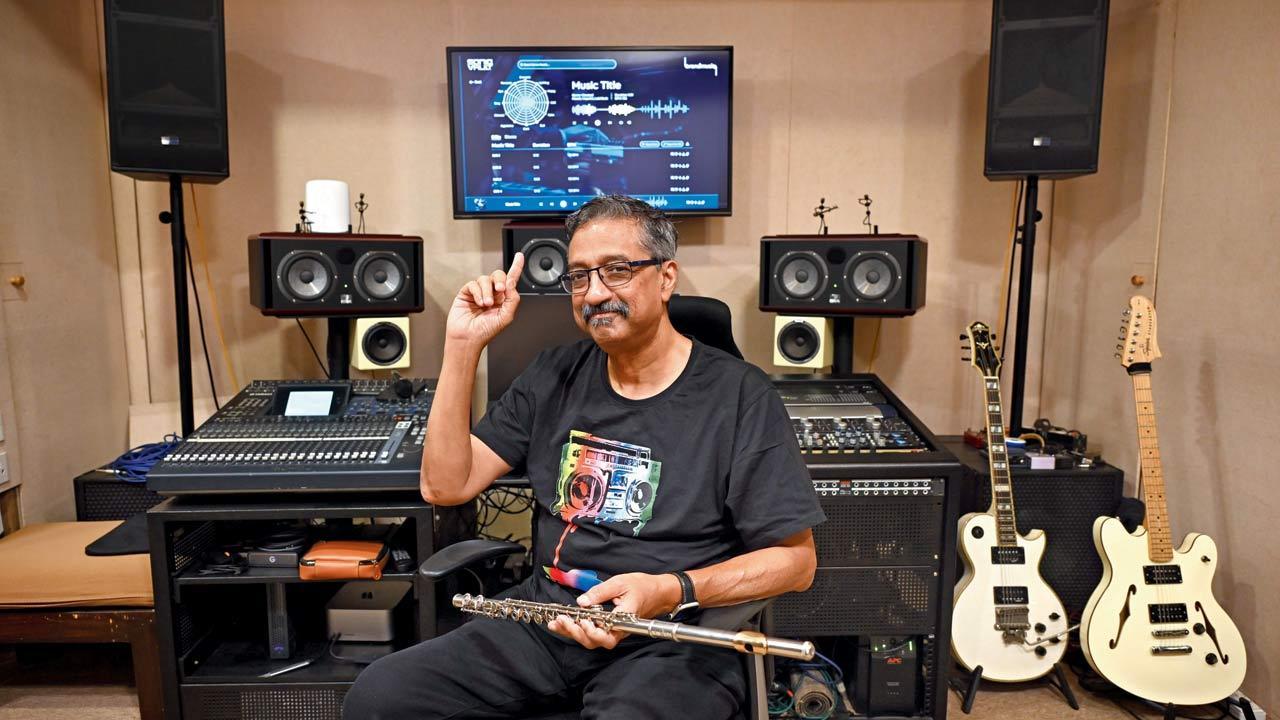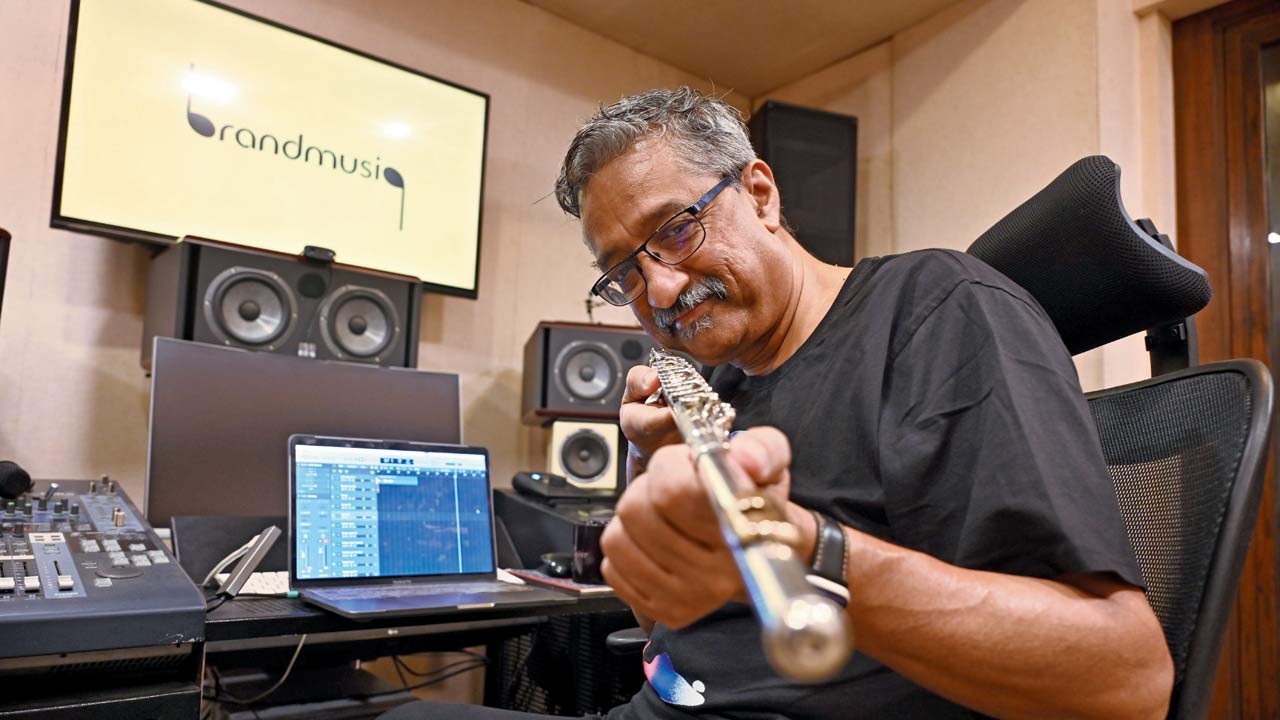A trailblazing agency that specialises in sonic branding for companies is now pushing the envelope by embracing AI in its creative process

Brandmusiq founder Rajeev Raja says they are six months away from launching a basic version of their AI platform, and about two years away from a more advanced, generative version. Pics/Atul Kamble
You know that feeling of anticipation you get on hearing the “zing” when you place a food order online? And how anyone standing across the room instantly knows you’ve ordered lunch just by hearing that sound? That’s the power of sonic branding.
ADVERTISEMENT
That “zing”, which echoes around the world a billion times a year, originated right here in Mumbai at Brandmusiq, a sonic branding agency based in Bandra West. “The quickest way to the customer’s heart is through their ear,” says founder and soundsmith Rajeev Raja, who quit his job as creative director at a leading ad agency in 2011 to set up Brandmusiq, pioneering the concept of musical logos or “Mogos” (a term coined by him) as a crucial part of building a brand’s identity.
Sonic branding itself is not a new concept, by any means, but there is one major difference that sets Mogos apart from the jingles of yore—the modern consumer’s shrinking attention span. “Consumers now spend a lot more time on social media, but will scroll past in a matter of seconds. They no longer have 30 seconds to spare for an entire jingle on TV. Three to four seconds is good, that’s what we call a Mogo. A short clip of 1.5 seconds that can invoke brand recall is even better; we call that a mini-Mogo. The ‘zing’ is an example of mini-Mogo,” says Raja.

“The goal is for the Mogo and mini-Mogo to have a Pavlovian effect; when you hear it, all the memories and associations come flooding back. It’s just like hearing a song from childhood; you don’t need to hear the whole song, just the first few notes will transport you to your grandparent’s house with the smell of food prepared by your grandmom,” adds Raja, who is also an accomplished Jazz flautist with several international tours under his belt.
Scaling up with AI
For Raja, sonic branding was a chance to marry his two great passions—branding and music. But his trailblazing doesn’t end there. Raja and Brandmusiq co-founder and CEO Ajit Varma have now set their sights on AI, and how they can harness it to optimise sonic branding further.
“One of the challenges that any company in modern world has is how it can scale up? As the business grows, speed becomes crucial. If our response time is slow, we miss out on opportunities. So we looked at ways to use AI to address this. One of the most basic ways is to use it as a repository or vault where we can store clients’ sonic assets—all the original scores of music used in their branding. AI will also be required to search for and retrieve this information in an intelligent manner. We should be able to search for music by, say, genres, moods, country. This is what we have planned for the most basic level of our AI platform,” says Raja, adding that they are just six months away from achieving this stage.
The next, more advanced stage of AI development will be to generate customised music for brands by adapting the Mogo for, say, the background score in a reel. “Brands will sometimes use stock music as a background score in videos or reels, etc. Instead, we can use AI to create new music with the brand’s own Mogo embedded in the melody, so that even that reel’s music will remind you of the brand. There may be 1,000 such pieces of content to be created in a year for a single brand, which will require quick turnaround. AI could achieve this in as little as 24 hours,” says Raja. This phase of AI development will take about two more years to achieve, he estimates.
Challenges ahead
It’s all the more unusual for Brandmusiq to embrace artificial intelligence at a time when many in creative fields are shunning it over concerns of copyright infringement and possible devaluation of art and edging out of human creativity.
Of these, copyright infringement is a very real concern and Brandmusiq is paying particular attention to prevent this with their AI, says Raja. “We are creating learning models for our AI platform based on our own content, from all the music we have created. There is also stock music that is licence-free, which AI can learn from. We don’t want to get into a situation where it creates any music that sounds similar to anything else out there. It’s also going to be a challenge to teach AI to create pieces that sound like music and not muzak,” he adds.
As for the other fears, AI is a long way off from posing a credible threat to human creativity, he says. “AI will not replace musicians. No AI is ever going to play the flute like me. We still need musicians to make music, to make Mogos. AI can’t do that. It can adapt the music created by us and save time on that, but it can’t feel the emotions in music,” adds Raja.
What is the tool: An AI-based sonic vault that will store all the sonic assets of clients and also enable intelligent search and retrieval of the content, based on principle of meta tagging. This will allow search by genre, mood, or beats per minute (bpm). At the advanced level, generative AI will help create musical content for diverse marketing needs with the Mogo embedded.
How will it work? The brand or creative agency will give a prompt with their requirement–duration of music, mood, bpm, purpose (for example, music for an Instagram reel or a TV commercial).
Whom will it help? It’ll help brands immeasurably. They will get branded music, not vanilla content. Even if it is background music for a video, it will have an element of their brand identity, says Raja.
 Subscribe today by clicking the link and stay updated with the latest news!" Click here!
Subscribe today by clicking the link and stay updated with the latest news!" Click here!







